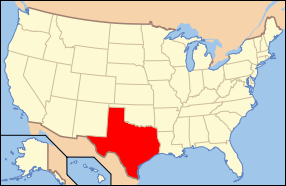 Image via Wikipedia
Image via Wikipedia© 2011 The Associated Press
Jan. 30, 2011, 9:38PM
CORPUS CHRISTI, Texas — Authorities know that thousands of men, women and children are trafficked into Texas. Proving it in a court of law is another matter.
Cases involving human trafficking are hard to tease from prostitution and illegal immigration cases and are harder to prosecute unless a victim informs on the case. Investigators say victims are compelled into involuntary servitude, captivity or prostitution, according to an article in the Sunday edition of the Corpus Christi Caller-Times.
"They may be victims of trafficking that do not even know it," Sean McElroy of Homeland Security Investigations told the newspaper.
McElroy handles trafficking and smuggling investigations for U.S. Immigration and Customs Enforcement's Houston office. He said many victims initially appear to be illegal immigration cases until weeks of interviews show that they entered the United States against their will.
A study by Texas Attorney General Greg Abbott found that human trafficking is far more common than the cases authorities have been able to prosecute. But Abbott spokesman Jerry Strickland said quantifying the problem with any degree of precision is nearly impossible "by nature of the fact that it's been in the shadows for so long. Police and other law enforcement agencies are trying to bring it out from the shadows."
Federal court records show no cases of human trafficking in 10 South Texas counties since 2000. Corpus Christi police said they cannot recall any cases where they were able to charge a suspect with trafficking, despite suspicions.
"The unfortunate part is that we don't have the statistics compiled for this area that maybe Houston or San Antonio have," said Amy Storbeck, a nurse who heads a Corpus Christi anti-trafficking nonprofit called Blue Nation.
Beginning this year, state law requires newly sworn law enforcement officers to take a basic course in human trafficking. Legislation has been proposed with the aim of equipping local law enforcement to crack down on human trafficking rings that lead to or pass through Texas.
A measure proposed by state Rep. Todd Hunter would create a shared statewide database. The Corpus Christi Republican reports that the database would store information relating to human trafficking arrests and convictions and provide demographic data to allow local law enforcement to detect patterns.
The attorney general's study said the state's busiest trafficking artery was the 900 miles of Interstate 10 that runs from El Paso to Houston, making both cities the state's busiest trafficking centers.
Traffickers also enter the U.S. from Mexico near Laredo and drive toward Houston, passing through Corpus Christi, McElroy said.
Corpus Christi police recall a local massage parlor staffed by a group of Asian women that some officers suspected was clearly a case of human trafficking. However, none of the women cried out to police, leaving little evidence on which to build a trafficking case. Officers ended up shutting down the business and hoping that resolved the issue.
"You don't always get them on the real crime," said Capt. John Houston of the Corpus Christi police vice and narcotics division. "We hear the tips. Someone is forced to work at a very low wage, working off a debt that never goes down. We know that exists here. It's just hard to find," he told the newspaper.
Said Hunter, "We still depend largely on kidnapping and prostitution laws to address human trafficking cases. A missing or kidnapped child whose face appears on a milk carton could actually be the victim of human trafficking."
___
Information from: Corpus Christi Caller-Times, http://www.caller.com
Human trafficking hard to prove, hard to stop | AP Texas News | Chron.com - Houston Chronicle


No comments:
Post a Comment